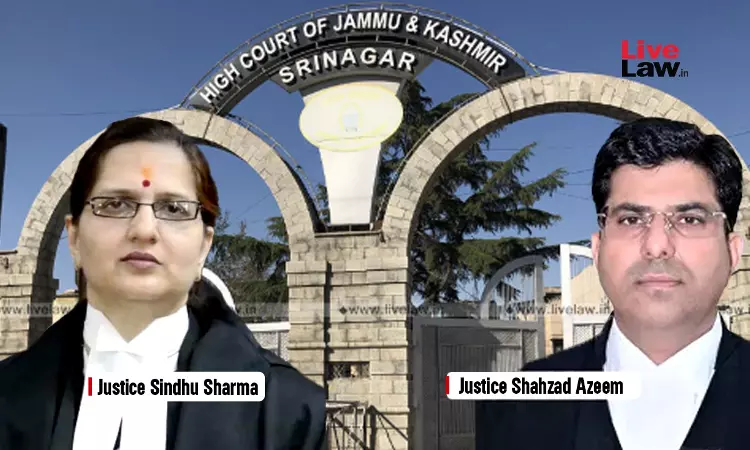- Home
- /
- High Courts
- /
- High Court of J & K and Ladakh
- /
- UAPA Provides Complete Mechanism...
UAPA Provides Complete Mechanism For Adjudication, NIA Act Cannot Be Invoked To Bypass Its Statutory Remedy: J&K High Court
LIVELAW NEWS NETWORK
22 Sept 2025 11:15 AM IST
The Jammu and Kashmir and Ladakh High Court has held that once such a statutory forum is available under the Unlawful Activities (Prevention) Act, 1967 (UAPA), an appellant cannot bypass it by invoking the appellate jurisdiction of the High Court under Section 21 of the National Investigation Agency (NIA) Act.The Court emphasised that the UAPA provides a complete mechanism from seizure...
The Jammu and Kashmir and Ladakh High Court has held that once such a statutory forum is available under the Unlawful Activities (Prevention) Act, 1967 (UAPA), an appellant cannot bypass it by invoking the appellate jurisdiction of the High Court under Section 21 of the National Investigation Agency (NIA) Act.
The Court emphasised that the UAPA provides a complete mechanism from seizure of property to adjudication by the Designated Authority, with further appeals to the Special Court and then to the HC.
Dismissing an appeal challenging the refusal of release of a seized vehicle allegedly used in terror-related activities, a Division bench comprising Justice Sindhu Sharma and Justice Shahzad Azeem observed,
“There is a complete mechanism provided under the UA(P) Act itself, right from the seizure of the property to production before the Designated Authority and, thereafter, the statutory appeal to the Special Court and then to the High Court. Therefore, once the statutory forum in the shape of Designated Authority is made available to the Appellant, in that event, the Appellant cannot be allowed to invoke the jurisdiction of the High Court under Section 21 of the NIA Act, so as to circumvent the statutory remedy.”
The matter arose out of an FIR No registered after a joint naka by the police and 3rd Rashtriya Rifles intercepted two individuals under suspicious circumstances. From their possession, the police claimed to have recovered 90 live AK-47 rounds and one live hand grenade. Investigations revealed their alleged links with the banned outfit Lashkar-e-Toiba (TRF).
A load carrier vehicle was allegedly found to have been used in terrorist activities and was seized with the approval of the Director General of Police under Section 25 of the UAPA. The Special Court (UAPA), Anantnag, dismissed the application for its release, observing that the matter was still pending before the Designated Authority. The appellants challenged this order before the High Court under Section 21 of the NIA Act.
Senior Advocate S.T. Hussain, assisted by Advocate Nida Nazir, appearing for the appellants, argued that the seizure was unlawful as the statutory requirements under Section 25 of the UAPA, including timelines and prior approval, were not adhered to. He maintained that the seized vehicle was the only source of livelihood for the family and not used for terror activities.
On the other hand, Senior Additional Advocate General Mohsin-ul-Showkat Qadri, with Ms. Nowbahar Khan, submitted that the vehicle was indeed used for transporting arms and ammunition for terrorist purposes and that all codal formalities, including approval from the DGP, were scrupulously followed. He argued that since the matter was under consideration before the Divisional Commissioner (Designated Authority), the appeal was not maintainable.
Court's Observations:
Justice Shahzad Azeem, speaking for the Bench, explained that Section 25 of the UAPA is a complete code in itself. It provides for seizure with prior approval, production before the Designated Authority within 48 hours, confirmation or revocation of seizure within 60 days, and appeal to the Special Court and thereafter to the High Court under Sections 25(6) and 28.
The Court underscored that the Divisional Commissioner, Kashmir, being the Designated Authority, had already issued notice dated 26 August 2025 to the registered owner, affording him an opportunity to contest the seizure. Instead of pursuing this statutory remedy, the appellants had “jumped the gun” by approaching the High Court under the NIA Act.
The Court held, “Therefore, once the statutory forum in the shape of Designated Authority is made available to the Appellant, in that event, the Appellant cannot be allowed to invoke the jurisdiction of the High Court under Section 21 of the NIA Act, so as to circumvent the statutory remedy.”
The Bench further observed that the order of the Special Court rejecting release of the seized vehicle was interlocutory in nature and thus not appealable under Section 21 of the NIA Act. It cautioned that entertaining such appeals would amount to usurping the jurisdiction of the Designated Authority, which is vested with powers akin to those of a civil court under Section 31 of the UAPA.
It also noted that under Section 30 of the UAPA, the Designated Authority has full jurisdiction to adjudicate claims and objections relating to seizure, and the statutory right of the owner to lay objections cannot be defeated by prematurely invoking appellate jurisdiction. Accordingly, the Court declined to examine arguments regarding timelines under Section 25, holding that they could be raised before the statutory forum itself.
Finding the appeal barred both under the scheme of the UAPA and Section 21 of the NIA Act, the High Court dismissed it along with connected applications, vacating any subsisting interim orders.
Case Title: Yasir Ahmad Bhat Vs UT Of J&K
APPEARANCES:
Mr S. T. Hussain, Senior Advocate with Ms Nida Nazir, Advocate For Petitioners
Mr Mohsin-ul-Showkat Qadri, Sr. AAG with Ms Nowbahar Khan, Assisting Counsel For UT Of J&K



